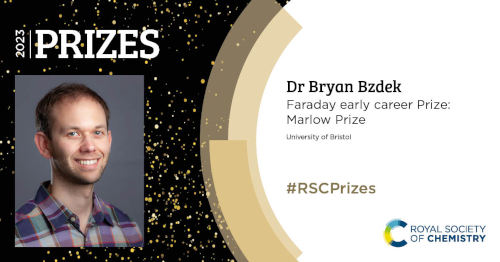Dr Bryan Bzdek has been named winner of the Royal Society of Chemistry’s Marlow Prize in recognition of brilliance in research and innovation.
His pioneering work within aersols spans various themes, including the surface composition of microscopic droplets; new particle formation in the atmosphere; and the physicochemical properties of respiratory aerosols. This year’s winners join a prestigious list of past winners in the RSC’s prize portfolio, 60 of whom have gone on to win Nobel Prizes for their work, including 2022 Nobel laureate Carolyn Bertozzi and 2019 Nobel laureate John B Goodenough. Dr Bzdek also receives £3,000 and a medal.
After receiving the prize, Dr Bzdek said: “I am honoured to be awarded the Marlow Prize, and I acknowledge the efforts of my research group and many collaborators who have contributed to the body of work recognised by this prize.”
Dr Bryan R Bzdek’s research group at the University of Bristol addresses grand challenges in the chemistry of aerosols, which are solid particles or liquid droplets suspended in air. Aerosols are central to climate, health, and materials synthesis. For instance, aerosols are a major contributor to air pollution, serve as the seeds for atmospheric cloud droplets, and are vehicles for disease transmission.
With his group, Dr Bzdek develops new tools to characterise the physical and chemical properties of aerosols. Currently, they are exploring how the surfaces of aerosol particles can affect their ability to grow into cloud droplets and alter climate. During the COVID-19 pandemic, Dr Bzdek co-led a team of scientists and clinicians who measured respiratory aerosols emitted by humans during a range of tasks, including breathing, speaking, singing, playing musical instruments, exercising, and undergoing medical procedures. This work led directly to changes in UK government guidance in the performing arts and in the NHS England infection control and prevention manual.
